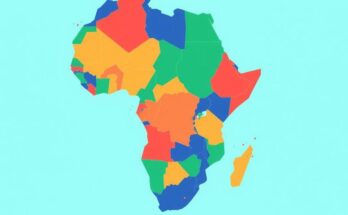Ecuador will hold a run-off election in April between President Daniel Noboa and Luisa González after a close election resulted in both candidates failing to secure a majority. Noboa received 44.28% of the votes, while González obtained 43.86%. The election reflects significant polarization, with widespread concerns over crime, poverty, and economic inequality affecting voter choices.
Ecuador is set for a run-off election scheduled for April, following a statistical tie in the recent elections. Incumbent President Daniel Noboa secured 44.28% of the votes, while former National Assembly member Luisa González received 43.86%. The remaining 14 candidates collectively obtained just 10% of the votes, highlighting increased political polarization among voters. As no candidate reached the required majority, the second round of elections will take place on April 13.
This upcoming election marks the second face-off between Noboa and González, as Noboa had previously defeated her in October 2023, a result of the impeachment of former President Guillermo Lasso which led to early elections. Noboa, who is affiliated with the National Democratic Action party and is known for his familial ties to the banana industry, campaigned on a hardline anti-crime agenda, although his effectiveness in addressing rising crime rates has faced scrutiny during his term.
González, representing the Citizen Revolution Movement and a former cabinet member under President Rafael Correa, parallels Noboa’s stance on enhancing military and police presence to alleviate crime. However, she diverges in her approach by advocating for increased social investment aimed at addressing the fundamental issues of poverty and crime.
Ecuadorian voters are concerned with the interplay of organized crime, energy shortages, and economic disparity. Currently, the nation’s homicide rate remains significantly high, with figures approximately nine times greater than the global average while intermittent electricity outages related to droughts contribute to public dissatisfaction. Notably, around 35% of the population lives in poverty.
Polls prior to the elections did not predict such close competition. Fernando León, a professor at the Universidad Internacional de Ecuador, remarked that “this type of political polarization is a phenomenon that’s never been seen in Ecuador,” attributing the narrow election results to a decline in Ecuadorians’ quality of life regarding security, employment, and access to essential services.
The National Electoral Council has announced a mandatory presidential debate scheduled for March 23, which both candidates will participate in.
In summary, Ecuador is experiencing notable political polarization following a tightly contested election that has led to a run-off between President Daniel Noboa and Luisa González. Concerns regarding crime, economic inequality, and power shortages are at the forefront of the electorate’s priorities. The upcoming debate and the election’s outcome will be crucial in addressing these pressing issues.
Original Source: latinamericareports.com




